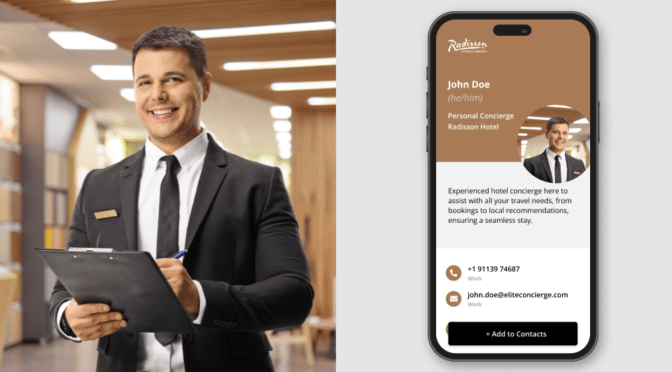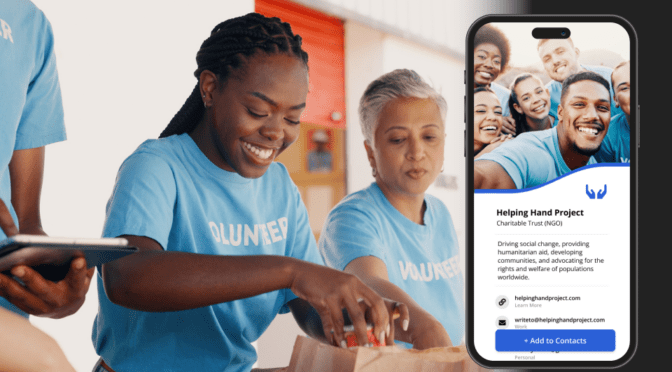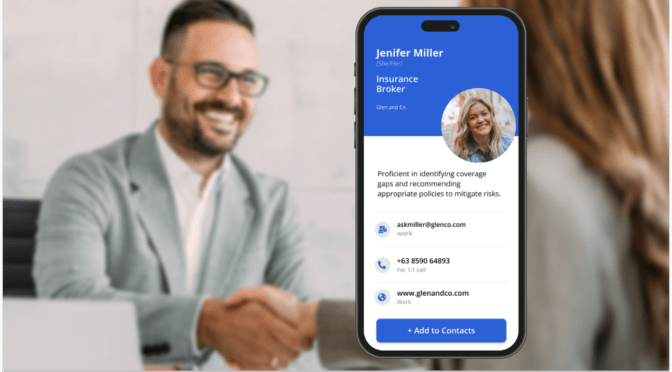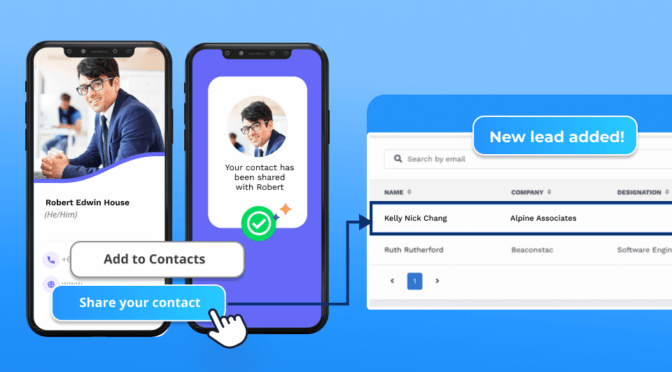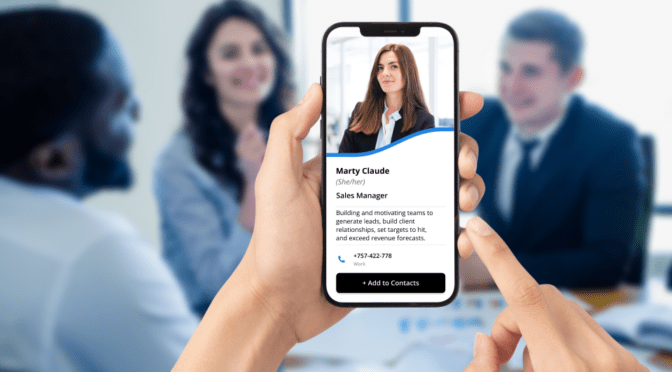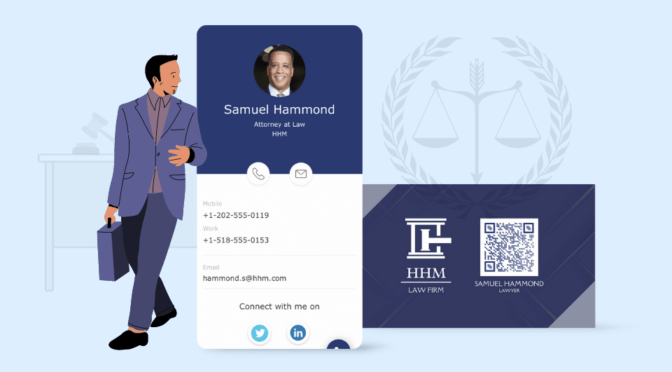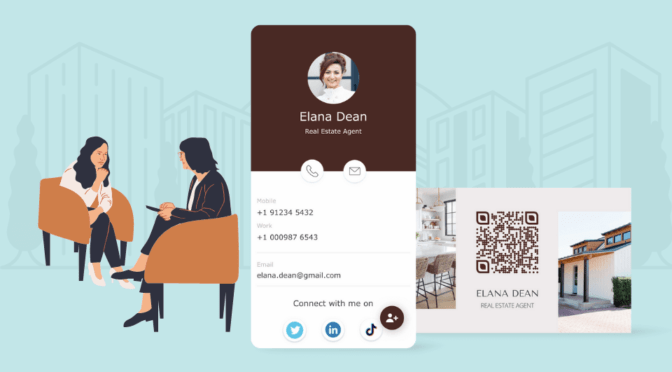Recruiting today is tougher than ever. A simple job post won’t cut it; only 36% of professionals are actively job hunting, while ghosting and poor communication derail even the best candidates.
The good news? 90% are open to the right opportunity, if it’s presented well.
That’s where digital business cards come in. They help recruiters build trust, stand out in outreach, and keep candidates engaged from first contact to final offer.
Let’s explore how.
Table of contents
- What is a digital business card for recruiters
- Digital business card templates for recruiters and HR professionals
- How to create a digital business card for recruiters
- 13 top digital business card benefits for recruiters
- 7 best practices for creating a digital business card for recruiters
- Level up your recruitment efforts with Uniqode
- Frequently asked questions
What is a digital business card for recruiters?
A digital business card for recruiters is a technologically advanced alternative (and replacement) to paper business cards. It helps recruiters establish a more successful first point of contact with candidates, followed by other engagements.
As a recruiter, you can quickly exchange your clickable details (as a link or a QR Code), such as name, photo, role, company, email, and other contact information. Additionally, you can use digital business cards to collect details about promising candidates or interact with fellow recruiters (via two-way contact sharing).
You can use these virtual cards at various touchpoints, such as:
- Job fairs
- Email signatures
- Networking events
- Social media profiles
Let’s learn more about how to get the best out of digital business cards for recruiters.
Digital business card templates for recruiters and HR professionals






How to create a digital business card for recruiters
Creating a digital business card is very simple with Uniqode’s digital business card solution. I have broken down the steps for you below:
Step 1: Log in to Uniqode and click “+Create”
Click +Create on the right side of the dashboard.

Step 2: Choose a digital business card template
If your organization’s Uniqode account has already created templates, they will appear on the “Select a Template” page for you to choose from.

You can also choose the “Start from scratch” option to customize a new template from scratch.

Step 3: Set up your profile information
On the “BUILD” tab, fill in all the fields under the “PROFILE INFORMATION” section. Your profile includes your name, headshot, company name, logo, and professional summary.

Step 4: Add your contact details to your digital business card
The “CONTACT DETAILS” section of the “BUILD” tab is where you can include your contact information. Add your phone numbers, email addresses, website links, and geographical location.

Step 5: Add your social media links with their corresponding icons
Add all relevant social media handles under the “SOCIAL LINKS” section of the “BUILD” tab. You can add 20+ social links with their corresponding icons to create an interactive business card. You can also include a custom URL.

Click “NEXT >” to continue.
Step 6: Design your digital business card to match your branding
Under the “CUSTOMIZE ” tab, you can customize your e-business card’s visuals. You can choose from various font styles and sizes and adjust its various color aspects.

Step 7: Enable the essential networking features you require

Click “NEXT >” to go to the “SET-UP” tab. This tab is where you get to enable features that can positively impact your networking efforts. You can turn on/off the following features based on your requirements:
- URL Domain: Select a custom domain for your digital business card (available on Team plans and above)
- Auto-download contact: Allow recipients to automatically download your contact details upon scanning your card
- Two-Way Contact Sharing: Let recipients submit their details on your e-business card as lead entries on the dashboard’s “Contact Manager” page. It’s an excellent tool for lead capture because you can export these leads to Salesforce or 700+ other CRMs via Zapier and API integrations
- GPS location: Track and display the geographical location of your digital contact card viewers (requires permission from users).
- Track IP location: Track and display engagement location based on the IP address of your viewers’ devices (requires permission from users).
- QR Code templates: Use your organization’s QR Code template for your digital business card.
Once you have enabled your preferred functionalities, click FINISH. You can begin your distribution strategies by sharing your digital visiting card over various channels.
13 top digital business card benefits for recruiters
Digital cards can level up your hiring strategy in many ways, from improving the way you network at events (both virtual and in-person) to streamlining the candidate experience.
Here are 13 reasons to consider creating digital business cards for your recruitment team:
1. Create a stellar first impression
The tables have turned today. Candidates spend time assessing whether a company is a good fit for them in various ways. That’s why you must first make a good impression on potential employees.
Using digital business cards for recruitment shows candidates that:
- Your organization embraces technology to streamline company workflows
- You value people’s time and prioritize offering a positive candidate experience
An e-business card can extend your company’s core values and brand identity. You can add links to your website, social media profiles, and career pages—all of which will help candidates learn more about your company, culture, and values.

Plus, digital cards give prospective employees a secure and instantly accessible contact channel. They’re also environmentally sustainable and a cheaper alternative to paper cards in the long run. After all, you never have to reprint them because you can edit them.
2. Make every digital touchpoint count
As a recruiter, you constantly contact potential employees through email and other social channels. One effective way to expand your talent pool is by leveraging digital business cards to streamline communication across these platforms.
Here’s how you can use digital business cards to optimize communication across these platforms:
a. Email
You can improve your email outreach by adding your digital business card to every hiring email. This will initially give candidates all the information they need, while your email will focus on assertive communication.
You can add an e-business card in two ways: The first is by directly embedding a card URL in the message. The second method is to share your card as a QR Code in your email signature, like this 👇.

That said, ensure that your card includes links to details such as the job description, company policy, and potential contractual obligations. It also helps to cover contingencies, acceptance deadlines, compensation, and benefits on your card.
b. LinkedIn and other networking sites
You’ll often use LinkedIn’s InMail messages to reach out to candidates. However, since the format involves connecting with profiles you’ve no prior link with, you may lose contact with qualified prospects after the initial stages.
A simple tip would be to share your e-contact card in these messages. Again, you can do it through a URL or a QR Code.
You can also feature your card on your LinkedIn profile bio and other social networking pages. This will provide interested applicants with direct and seamless access to the recruitment process.
Beyond that, it would be best to create one digital business card QR Code for all your social media pages. That’ll ensure uniformity across multiple channels and prevent any potential miscommunication of information.
3. Simplify networking and lead generation at events
Most networking events, conferences, and job fairs tend to be hectic. Applicants stream in with multiple questions, and booths are often overcrowded, leaving little room for meaningful professional dialogue.
To counter this challenge, simply set up a plaque with your digital business card QR Code at the booth and direct prospects to it. If the event is more mobile or involves multiple isolated conversations, you can use the Apple Wallet Business Card to share your card information.
You can also use these wallet passes to network at recruitment events, seminars, and talent workshops. You can connect with fellow recruiters and share your business cards at these events to stay in touch with them.
Ultimately, the more access points you offer, the better. That’ll let you expand your recruitment pool without individually chasing down leads.
💡Pro Tip: Use Uniqode’s two-way contact sharing at events to exchange contact information using the same card. Once you enable it, recipients will see a prompt to share their details with a form.

- You can customize the fields in the form to gather audience and purpose-specific information from the recipient.
- For example, if you’re explicitly sharing cards to schedule interviews, add fields to ask any pre-interview questions from a potential candidate.
4. Analyze, filter, and track applicant data
We get it—it isn’t easy to keep track of all the leads you’ve gathered so far. And it becomes even more challenging if candidates are spread across multiple recruitment channels. A digital address book can help if it comes with your e-business card.
A digital address book is a centralized list of the information you’ve collected through two-way contact sharing from different events and sources. You can use this collection of leads to identify the most qualified prospects and fast-track the hiring process.
Let’s understand how to use a digital address book with an example:
As a technology recruiter, you’ve discovered ten recruits from a tech event.
Once you’ve created a designated card for an event, use your digital business card solution’s labeling feature to mark it. For example, you might label the card for tech recruitment as “Tech.”
After labeling, you’re all set to share your card with prospects. The leads collected via this card are automatically stored in the digital address book.
While analyzing the collected leads later, you can filter the leads that have come via the cards labeled “tech” and focus on nurturing them.
Now, you can:
- Schedule follow-up messages
- Share crucial information or files
- Maintain a consistent line of communication
All of this is done just by centralizing the information from your e-contact card.
💡Pro tip: Integrate Google Analytics with Uniqode to access location—and device-specific information about digital business card interactions, such as saves, scans, views, and more.
![]()
- Use Google Analytics’ expansive insights to monitor high-performing card formats and identify the best recruitment channels.
- Learn more about your candidate pool, including interests, demographics, etc.
- Use Uniqode’s dashboard to zoom into specific card data using a filter for card analytics.
5. Streamline the interview process
Approximately 78% of candidates have ghosted a prospective recruiter during the interview.
Why? A critical factor is the lack of insight into the employer. Most candidates abandon the selection process when they aren’t too confident about the company they’re interviewing with.
This is where you can use e-business cards to build transparency in the interview process. You can share your business card with professional and organizational details in interview rounds to let candidates know who they’re speaking to.
Not only that, but you can also add a Google Maps link to the card to help candidates quickly locate your premises for an in-person interview. A map link itself assures candidates of your organization’s physical presence.
Here’s a basic template for an interviewer’s digital business card:

6. Move beyond a 3.5″ x 2.0″ space
Reports suggest that 75% of job-seekers actively consider an employer’s brand before they apply for a position.
Now, picture the standard 3.5″ x 2.0″ paper business card.
Can you squeeze enough information in there to convince a candidate that your company is the right fit for them? The answer is most definitely no.
You won’t have to deal with this issue when using digital business cards for recruitment.
Simply embed a link to a landing page to educate candidates on your brand and talk about your:
- Mission statement
- Organization values
- Growth opportunities
- Team member welfare schemes
This way, you aren’t limited by space and can include as much information as possible. Even better, everything is entirely customizable even after you’ve shared the cards.
7. Personalize at scale for role-specific hiring
Hiring for design, engineering, and customer service roles? Your approach can’t be one-size-fits-all.
With digital business cards, you can create role-specific cards that highlight relevant job descriptions, portfolios, or benefits. For example, a card for tech roles might include links to GitHub or Stack Overflow, while one for high-paying travel jobs in healthcare could point to testimonials from current travel nurses or information about travel and housing stipends.
This lets recruiters:
- Personalize outreach without rewriting every message
- Tailor information based on function, seniority, or location
- Scale candidate engagement while keeping it relevant
And since everything’s editable, you can tweak your cards as roles evolve, no need to start from scratch. For deeper insights into candidate preferences and role requirements, HR platforms like PeopleHum can provide valuable data that helps refine your personalization strategy across different roles and departments.
8. Integrate seamlessly with your recruitment tech stack
A good recruitment tool doesn’t work in isolation, and your digital business card shouldn’t either.
The right digital business card platform integrates with your existing HR software like ATS (Applicant Tracking Systems like Keka), CRM software, email platforms, and calendar apps. This allows for:
- Automatic contact syncing
- Easy scheduling and follow-ups
- Centralized data collection for candidate tracking
For instance, when a candidate scans your digital business card, their contact gets automatically logged in your CRM, saving time and minimizing manual errors.
With Uniqode, you can connect your digital business cards to 7000+ apps via native integrations and tools like Zapier, Make, and HubSpot.
That means your recruiting workflows, from lead capture to onboarding, can stay smooth, automated, and admin-light.
9. Ensure consistent branding across your recruitment team
Your candidates don’t just meet you, they interact with your entire hiring team. Inconsistent communication or branding can create confusion or dilute your employer’s image.
Digital business cards ensure:
- Every recruiter’s contact card follows brand guidelines
- Company logos, fonts, and colors remain unified
- Candidates receive a consistent, professional experience regardless of who they talk to
Whether you have a team of 5 or 50 recruiters, you can centrally manage and update everyone’s cards from a single dashboard. No more off-brand LinkedIn links or outdated job titles!
10. Support accessibility and inclusive hiring
A paper card can’t adapt to everyone’s needs, but digital ones can.
Digital business cards promote accessibility and inclusive communication by offering:
- Screen-reader compatibility for visually impaired candidates
- Multiple language support to bridge language gaps
- Mobile-optimized, tap-friendly design for easier interaction
They also eliminate the stress of needing physical materials at in-person events, making it easier for candidates with physical disabilities to connect with you quickly and comfortably.
Inclusive hiring starts with inclusive communication, and digital business cards help you get there.
11. Protect candidate data with enterprise-grade security
Recruiters handle sensitive candidate data every day, from email addresses to personal resumes. Using a secure digital business card solution helps you protect that information at every touchpoint.
Uniqode’s platform, for example, offers:
- SOC 2® Type 2 compliance
- GDPR and CCPA readiness
- Multi-factor authentication (MFA)
- Single Sign-On (SSO)
- Password-protected card access
You can also restrict who can view your card and deactivate it instantly if a recruiter leaves the company.
Because in hiring, trust starts with how you handle data.
12. Scale effortlessly across teams and time zones
Whether you’re a boutique agency or an enterprise hiring across continents, digital business cards grow with you.
You can:
- Onboard new recruiters in minutes
- Spin up cards for different teams, roles, or locations
- Support global hiring without printing or shipping delays
Heading to a career fair in Berlin and another in Bangalore? Just update location info and language preferences on your multilingual business cards and go. No reprints, no wait times. Digital business cards are built for scale, so your hiring strategy can be too.
13. Save more with every hire
Let’s be honest, recruiting costs add up fast. Expenses can spiral between printed cards, event materials, follow-ups, and tech tools.
Digital business cards help reduce printing and reprinting costs, manual admin and scheduling efforts and lost lead opportunities due to poor contact sharing
Plus, many platforms (like Uniqode) offer team plans that allow bulk deployment, management, and analytics, all at a fraction of the cost of traditional methods.
In short: they’re budget-friendly and efficiency-smart.
7 best practices for creating a digital business card for recruiters
Ready to create digital business cards for your recruiters? Check out these best practices before creating one:
1. Add interactive CTAs to spark immediate action
Clear, clickable CTAs guide candidates on what to do next and reduce drop-offs during the hiring journey.
How to do it right?
- Add buttons like: “Apply Now,” “Schedule Call,” “Learn More,” or “Save This Role.”
- Use color contrast to make CTAs stand out on your card.
- Link directly to job descriptions, forms, or sign-up pages.
- Change CTA copy based on hiring stage (e.g., “Meet Your Interviewer” post-screening).
- Use emoji or icons to make CTAs more engaging.
2. Include a recruiter’s Calendly or meeting links
Simplifies scheduling and saves time for both you and the candidate.
How to do it right?
- Add a “Book a Call” CTA linking to your Calendly or other scheduling tool.
- Use different booking links for screening, interviews, or Q&A sessions.
- Set buffer times and availability to avoid scheduling conflicts.
- Use branding in your Calendly (custom header or messaging) for a consistent experience.
- Send automated reminders post-booking via your scheduling tool.
3. Embed a recruiter introduction video
A short video adds personality and helps candidates connect with you instantly.
How to do it right?
- Record a 30–60 second intro: name, role, what you’re hiring for, and a friendly invite.
- Host videos on YouTube, Loom, or your career page and embed the link.
- Add subtitles for accessibility.
- Tailor the video based on department or region.
- Keep tone informal and relatable, this isn’t a corporate keynote.
4. Segment cards by hiring stage
Different stages = different info. A segmented approach personalizes the experience.
How to do it right?
- Create distinct cards: Outreach | Interview | Post-Offer.
- Outreach card: Include job highlights, application CTA, intro video.
- Interview card: Add calendar invite, office directions, interview prep tips.
- Post-offer card: Share benefits, onboarding resources, or a welcome message.
- Use labels to track card performance across stages.
5. Use location-based personalization
Candidates value context. Personalizing for their location shows effort and relevance.
How to do it right?
- Mention the city or country in your greeting: “Hey from our Bangalore team!”
- Link to office photos, Google Maps location, or local events.
- Add commute details or nearby attractions.
- Use dynamic card fields if your digital business card platform supports geo-customization.
- Highlight local team members or leadership in that region.
6. Include candidate support information
Shows you care about candidate comfort and accessibility throughout the process.
How to do it right?
- Add a “Need Help?” CTA linking to a support page or contact form.
- Include your recruiter assistant’s or coordinator’s contact.
- Add links for rescheduling, accessibility accommodations, or FAQs.
- Use icons to indicate where to find help on the card.
- Include live chat or chatbot links if available.
7. Highlight diversity and inclusion initiatives
Candidates want to see that your company values inclusivity, not just in policy, but in practice.
How to do it right?
- Link to your company’s DEI mission page or ERG (Employee Resource Groups) highlights.
- Include a short statement on your digital business card like “We’re committed to inclusive hiring.”
- Add CTAs like “Explore Our Culture” or “Meet Our DEI Team.”
- Feature inclusive benefits (parental leave, mental health, etc.) as card highlights.
- Use visuals that reflect diverse team members (with consent).
Level up your recruitment efforts with Uniqode
Paper cards aren’t relics yet. But they will be soon.
That’s why you need digital business cards: to stand out in the crowd, quickly share your contact information, and collect candidate information.
To choose a good digital business card platform, consider design and customization options, contact-sharing capability, and security features. You should also check out different ways to share your digital cards.
Make an informed choice based on your requirements and simplify your recruitment workflows with digital business cards.

Frequently asked questions
1. What should recruiters include on their digital business cards?
You should create digital business cards for recruitment based on the context you’re hiring for. For example, if you want to fill an executive role, tailor the information to offer a detailed description of the position.
In general, it’s best to include multiple links to communication channels, custom meeting links for interviews, and educational material on company culture.
2. Are digital business cards for recruiters worth it?
Yes, virtual business cards can streamline your hiring process. For instance, two-way contact sharing can help you seamlessly communicate with applicants. Managers can also use those details to track candidate data in the subsequent recruitment stages.
Other benefits include boosted referrals, enhanced employer branding, and better networking opportunities.
3. How expensive are digital business cards?
Different e-business card solutions offer different pricing. At Uniqode, we structure our pricing plans to cater to businesses of all sizes. For instance, our “Team” plan costs a monthly fee of just $6 per user.
That package includes bulk card creation functionality, dedicated analytics, two-way contact sharing, an integrated contact manager, and more. We also offer a custom enterprise-level solution for 250+ users.
4. How do digital business cards improve the candidate experience?
Digital business cards provide rich, interactive, and always-accessible profiles. They replace outdated formats with clickable links, such as social profiles, videos, or role info, so candidates gain a deeper understanding of your organization instantly Plus, real-time updates prevent confusion from outdated contact details.
5. What are the benefits of digital business cards at recruitment events?
At job fairs and conferences, digital business cards can-
1. Instant sharing with a quick scan or tap—no printing required
2. No risk of misplacement like with traditional paper cards
3. Capture leads on the spot using embedded forms
4. Track engagement metrics (views, clicks, saves) in real time
5. Automatically sync contacts to your CRM or ATS
6. Professional and modern first impression for your brand
7. Environmentally friendly and cost-effective in the long run
6. How do digital business cards help recruiters expand their talent pool?
Digital business cards maximize reach without manual follow-ups by enabling one-click sharing across channels, email, LinkedIn, virtually, or in person. Integrated forms and CRM syncs allow automatic lead capture, ensuring hot prospects don’t fall through the cracks. The result: a broader, better-managed talent pipeline.
7. Can digital business cards integrate with our existing ATS and CRM software?
Yes. Many digital business card platforms natively connect with popular systems or through APIs and webhooks. For example, Uniqode supports 7,000+ app integrations and direct CRM parsing. Thus, new candidate details can flow seamlessly into your tech stack, without manual data entry, improving efficiency and accuracy.
8. How secure are digital business cards to protect candidate data and privacy?
Security is core to enterprise-grade digital business card tools. Platforms like Uniqode offer ISO 27001:2013-certified infrastructure with encrypted, GDPR‑ and CCPA-ready frameworks, multi-factor authentication, and optional password/PIN-controlled access. Most digital business card solutions also allow fine-grained control over who can view cards and when they can be deactivated.
9. How scalable are digital business cards for large recruitment teams or global organizations?
Digital business card platforms are built for scale. You can deploy hundreds or thousands of cards instantly, tagged by region, department, hiring stage, etc., and update them globally in real-time. Cards work across geographies with location-sensitive content and multi-language support, making them ideal for global hiring without logistics or reprint delays
Sukanya is a Content Marketer at Uniqode and a former journalist who fuses newsroom curiosity with SEO-savvy storytelling to help brands grow online. She’s on a mission to demystify digital business cards, digging deep into data, trends, and user behavior to spotlight how they transform how we network and generate leads. Her content doesn’t just inform—it equips. Outside the digital realm, she’s either rescuing animals, getting lost in a plot twist, whipping up kitchen experiments, or chasing stories worth telling.
Related Posts
Try Now - Free Forever! Create A Free Digital Business Card








